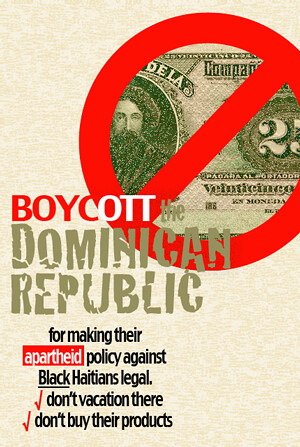The current UN occupation of Haiti is also being resisted by Haitians. Many have rallied peacefully in the streets to protest the occupation. Thousands have died since the US financed coup against the Democratically elected government of Jean Bertrand Aristide. One leading human rights activist was Lovinsky Pierre-Antoine. August 12th will mark the second anniversary of the disappearance of Lovinsky Pierre-Antoine.
Vinco, as he is known to his friends was a tireless advocate and political activist who was committed to sovereignty and justice for Haiti.
"Lovinsky Pierre-Antoine is the coordinator of the Fondasyon Trant Septanm (September 30th Foundation) that works with the victims of the coup d'états of 1991 and 2004. As a young man, Pierre-Antoine worked on literacy projects with street children in his hometown of Port de Paix. After moving to Port au Prince and completing his training as a psychologist, he began creating organizations such as: Fondsayon Kore Timoun Yo (Foundation for the Support of Children) for young street children in Port au Prince ; FAM (Foyer pour Adolescentes Mère), a centre for teenage mothers ; and Map Vivre ("I Live"), a program designed to give psychological and medical aid to the victims of the first coup against Aristide in 1991."In 2007, a few days before he was disappeared in UN-occupied Haiti, Lovinsky Pierre Antoine wrote a declaration remembering the first occupation on the occasion of this current second Western occupation of Haiti.
I've attempted a translation of some of his statement below, it's very rough, so if anyone wants to correct me, they are welcome to.
Commémoration du 28 Juillet Texte de la déclaration de la FTSLovinsky Pierre-Antoine was disappeared in UN-occupied Haiti on August 12, 2007. He has never been found. No investigation of his disappearance has ever been formally announced or publicized by either the Preval government or the UN/US-occupiers, both of whom he had denounced.
28 Jiyè 2007 DEKLARASYON
28 July 1915 - 28 July 2007, 92 years since the Yankee's army, which represents the imperialist force of America embarked on catastrophe for our country. This began 19 years of humiliation, 19 years of shame, 19 years of hardship, 19 years of darkness, 19 years of crisis, 19 years of hurt pride. What happened on July 28 is a curse on our nation's history.
We remember the way they slaughtered our peasants
We remember the way they slaughtered Charlemagne Péralte
We remember Rosalvo Bobo
We remember Pierre Sully
We remember all the rest...
We remember the Cacos
We remember all who fell with their guns in their hands
Yesterday's times are the same as today's times...
Honor to all...
Respect to all...
They sacrificed their lives
to save our honor, to save the dignity of our flag.
Shout 92.000 times for them
Anthony Phelps, a great Haitian intellectual, and writer wrote:
"And one morning when fresh blood filled the great mast and crushed the Chorus
The solidly incorruptible were moved to action
And it was Pierre Sully
And it was the strong Capois
And it was the Marchaterre
In vain on a door was Charlemagne Péralte sacrificed and the five thousand Cacos gave their blood and all their wounds, in vain.
The green god of the Yankees was more powerful than the loas
Read the full text here (in Kreyol)
___________
FONDASYON TRANT SEPTANM ("FTS")
Boite Postale 19042, #3, 2e Impasse Lavaud Port-au-Prince, HAITI
Tél: 509 – 706 – 9177 / 509 – 244 – 7987 / 88,
Couriel: fondasyontrantseptanm@yahoo.fr
BACKSTORY:
Rights Advocate Missing In Haiti: Lovinsky Pierre Antoine
Di yo nou vle jwen Lovinsky VIVAN!
We are urging for the safe return of Lovinsky Pierre-Antoine
To Better understand who would best benefit from the silencing and elimination of Lovinsky's activism, read:
The July 28, 2007 declaration of Lovinsky Pierre Antoine's Fondasyon Trant Septanm (in http://www.blogger.com/img/blank.gifKreyol, by Lovinsky Pierre Antoine, Haitian Perspective, July 31, 2007
Lovinsky Pierre Antoine on the Visit of Ban Ki Moun to Haiti (in French), by Lovinsky Pierre Antoine, Haitian Perspective, August 7, 2007
Sovereignty and Justice in Haiti - An exclusive Haiti Information, interview with Lovinsky Pierre-Antoine by Darren Ell | This is the first of a two-part interview, February 18, 2007
Sovereignty and Justice in Haiti by Darren Ell, Part two of a two-part interview
Haiti Information Project, March 4, 2007







